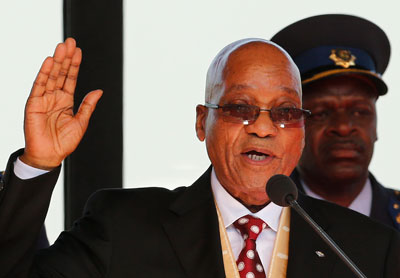Freedom of expression advocates in South Africa are concerned that the new Ministry of Communications, announced by President Jacob Zuma when he unveiled his cabinet on May 25, will compromise the independence of the public broadcaster and serve as a propaganda office.
Entering his second term as president following the African National Congress’s (ANC) victory in national elections this month, Zuma said the previous Department of Communications would be split in two. In its place he has created a new Ministry of Telecommunications and Postal Services, responsible for the technology industry and the post office which can offer financial services in remote areas of the country, and a Ministry of Communications responsible for “overarching communication policy and strategy, information dissemination and publicity as well as the branding of the country abroad.”
The new communications ministry will oversee the South African Broadcasting Corporation (SABC); the broadcasting and telecommunications regulator, the Independent Communications Authority of South Africa (ICASA); the Media Development and Diversity Agency (MDDA) which funds community media; and Brand South Africa and the Government Communications and Information System (GCIS)–both of which administer public relations.
The civil society group Right2Know, established in 2010 to fight the Protection of State Information bill which threatens whistleblowers and investigative journalists, said in statement this week that Zuma had conflated “communication policy and government propaganda…signaling an intention to ensure various institutions will be used to amplify government propaganda rather then to create a democratic communication system for all South Africans.”
A spokesman for President Zuma did not respond to CPJ’s requests for comment.
Right2Know national coordinator Mark Weinberg told CPJ that the very creation of what is effectively “an information ministry” was worrying. “Government should drive policy, but what we’re seeing now is that GCIS and marketing have been brought together and government propagandists will be driving policy,” he said.
The decision to group the already compromised SABC with organizations committed to publicizing positive news and promoting the South African “brand” rang further alarm bells, according to media reports.
While the government has yet to detail the different roles of each department, media reports have raised concerns about the decision to separate telecommunications from broadcasting in an age of convergence. The independence of key institutions such as ICASA and the SABC is also in question.
Civil society activists, media commentators, and opposition political parties have also expressed disquiet about the credentials of the officials tasked with running the new ministries, according to news reports.
The appointment of former State Security Minister Siyabonga Cwele as the minister for telecommunications was a “chilling” move, said opposition Member of Parliament and shadow minister for communications Marion Shinn. She said the appointment indicates the government’s “intention to control the Internet, its various platforms and electronic surveillance.” Over the past four years, Cwele has presided over the Protection of State Information Bill, dubbed the “secrecy bill” by its opponents. It was passed last year and is awaiting Zuma’s signature.
While Shinn welcomed the appointment of Faith Muthambi as the new communications minister, other media reports have pointed to a speech made by Muthambi in 2013 in which she criticized the media for disregarding the government’s good service delivery and for continuing “to distort and ignore information provided by government in a transparent and accountable manner.”
Veteran journalist and media commentator Chris Moerdyk is pessimistic about the new configuration of ministries. “South Africa … should prepare itself for an entirely new level of ill-conceived spin” he wrote in a recent column. He said all indications are that the ANC remains determined to control the SABC, “the only source of information available to roughly 70 percent of the voting public.”
[Reporting from Cape Town]
